Related Research Articles

Srinivasa Ramanujan was an Indian mathematician who lived during the British Rule in India. Though he had almost no formal training in pure mathematics, he made substantial contributions to mathematical analysis, number theory, infinite series, and continued fractions, including solutions to mathematical problems then considered unsolvable. Ramanujan initially developed his own mathematical research in isolation: according to Hans Eysenck: "He tried to interest the leading professional mathematicians in his work, but failed for the most part. What he had to show them was too novel, too unfamiliar, and additionally presented in unusual ways; they could not be bothered". Seeking mathematicians who could better understand his work, in 1913 he began a postal correspondence with the English mathematician G. H. Hardy at the University of Cambridge, England. Recognising Ramanujan's work as extraordinary, Hardy arranged for him to travel to Cambridge. In his notes, Hardy commented that Ramanujan had produced groundbreaking new theorems, including some that "defeated me completely; I had never seen anything in the least like them before", and some recently proven but highly advanced results.
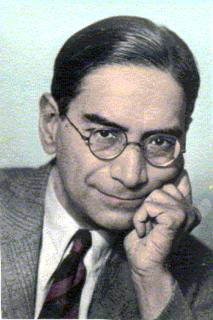
Prasanta Chandra Mahalanobis OBE, FNA, FASc, FRS was an Indian scientist and statistician from erstwhile Bengal. He is best remembered for the Mahalanobis distance, a statistical measure, and for being one of the members of the first Planning Commission of free India. He made pioneering studies in anthropometry in India. He founded the Indian Statistical Institute, and contributed to the design of large-scale sample surveys. For his contributions, Mahalanobis has been considered the father of modern statistics in India.

Harish-Chandra FRS was an Indian American mathematician and physicist who did fundamental work in representation theory, especially harmonic analysis on semisimple Lie groups.

The University of Madras is a public state university in Chennai, Tamil Nadu, India. Established in 1857, it is one of the oldest universities in India, incorporated by an Act of Legislative Council of India under the British government.

Calyampudi Radhakrishna Rao, FRS known as C. R. Rao is an Indian-American mathematician and statistician. He is currently professor emeritus at Pennsylvania State University and Research Professor at the University at Buffalo. Rao has been honoured by numerous colloquia, honorary degrees, and festschrifts and was awarded the US National Medal of Science in 2002. The American Statistical Association has described him as "a living legend whose work has influenced not just statistics, but has had far reaching implications for fields as varied as economics, genetics, anthropology, geology, national planning, demography, biometry, and medicine." The Times of India listed Rao as one of the top 10 Indian scientists of all time. Rao is also a Senior Policy and Statistics advisor for the Indian Heart Association non-profit focused on raising South Asian cardiovascular disease awareness.
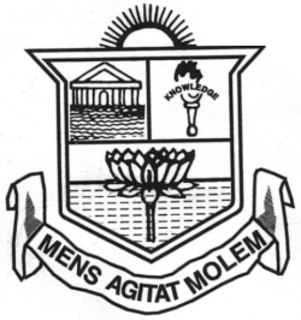
Pachaiyappa's College is one of the oldest educational institutions in Chennai, in the South Indian state of Tamil Nadu. In addition, it is the first sole Indian college in Madras Presidency.

Conjeevaram Srirangachari SeshadriFRS was an Indian mathematician. He was the founder and director-emeritus of the Chennai Mathematical Institute, and is known for his work in algebraic geometry. The Seshadri constant is named after him. He was also known for his collaboration with mathematician M. S. Narasimhan, for their proof of the Narasimhan–Seshadri theorem which proved the necessary conditions for stable vector bundles on a Riemann surface.
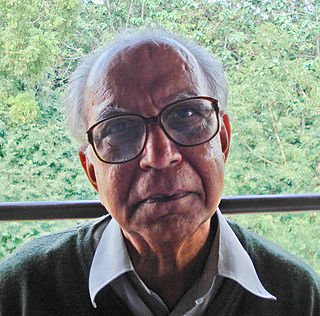
Mudumbai Seshachalu NarasimhanFRS was an Indian mathematician. His focus areas included number theory, algebraic geometry, representation theory, and partial differential equations. He was a pioneer in the study of moduli spaces of holomorphic vector bundles on projective varieties. His work is considered the foundation for Kobayashi–Hitchin correspondence that links differential geometry and algebraic geometry of vector bundles over complex manifolds. He was also known for his collaboration with mathematician C. S. Seshadri, for their proof of the Narasimhan–Seshadri theorem which proved the necessary conditions for stable vector bundles on a Riemann surface.

Sathamangalam Ranga Iyengar Srinivasa Varadhan FRS is an Indian American mathematician who is known for his fundamental contributions to probability theory and in particular for creating a unified theory of large deviations.
The DST-ICTP-IMU Ramanujan Prize for Young Mathematicians from Developing Countries is a mathematics prize awarded annually by the International Centre for Theoretical Physics in Italy. The prize is named after the Indian mathematician Srinivasa Ramanujan. It was founded in 2004, and was first awarded in 2005.
Sundararaman Ramanan is an Indian mathematician who works in the area of algebraic geometry, moduli spaces and Lie groups. He is one of India's leading mathematicians and recognised as an expert in algebraic geometry, especially in the area of moduli problems. He has also worked in differential geometry: his joint paper with MS Narasimhan on universal connections has been influential. It enabled SS Chern and B Simons to introduce what is known as the Chern-Simons invariant, which has proved useful in theoretical physics.
Indian Mathematical Society (IMS) is the oldest organization in India devoted to the promotion of study and research in mathematics. The Society was founded in April 1907 by V. Ramaswamy Aiyer with its headquarters at Pune. The Society started its activities under the name Analytic Club and the name was soon changed to Indian Mathematical Club. After the adoption of a new constitution in 1910, the society acquired its present name, namely, the Indian Mathematical Society. The first president of the Society was B. Hanumantha Rao.
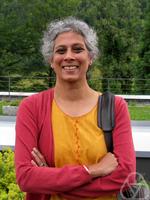
Sujatha Ramdorai is an algebraic number theorist known for her work on Iwasawa theory. She is a professor of mathematics and Canada Research Chair at University of British Columbia, Canada. She was previously a professor at Tata Institute of Fundamental Research.
Kanakanahalli Ramachandra was an Indian mathematician working in both analytic number theory and algebraic number theory.
The Hardy–Ramanujan Journal is a mathematics journal covering prime numbers, Diophantine equations, and transcendental numbers. It is named for G. H. Hardy and Srinivasa Ramanujan. Together with the Ramanujan Journal and the Journal of the Ramanujan Mathematical Society, it is one of three journals named after Ramanujan.
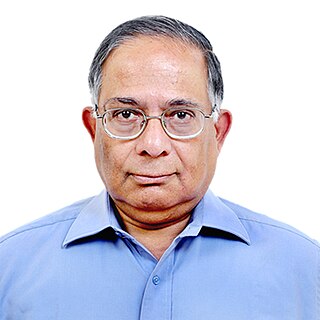
Kalyan Bidhan Sinha is an Indian mathematician. He is a professor at the Jawaharlal Nehru Centre for Advanced Scientific Research, and Professor Emeritus for life of the Indian Statistical Institute.
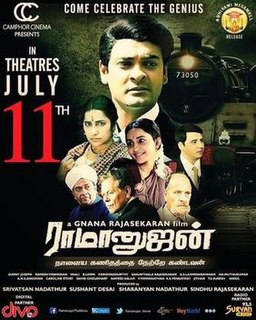
Ramanujan is a 2014 biographical film based on the life of Indian mathematician Srinivasa Ramanujan. The film, written and directed by Gnana Rajasekaran, was shot back to back in the Tamil and English languages. The film was produced by the independent Indian production house Camphor Cinema, ventured by Srivatsan Nadathur, Sushant Desai, Sharanyan Nadathur, Sindhu Rajasekaran. The cast consists of Indian and British film, stage and screen personalities. It marks the Tamil debut of Abhinay Vaddi, the grandson of veteran Tamil film actors Gemini Ganesan and Savitri, as the protagonist.
Amalendu Krishna is an Indian mathematician in the Department of Mathematics, Indian Institute of Science (IISc), Bangalore, specializing in algebraic cycles and K-theory. He was awarded the Shanti Swarup Bhatnagar Prize for Science and Technology, India's highest prize for excellence in science, mathematics and technology, in the mathematical sciences category in the year 2016.
References
- ↑ "Sundararaman Ramanan". Chennai Mathematical Institute . Retrieved 17 April 2018.